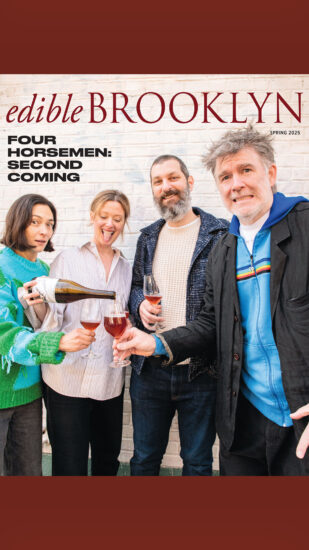Caroline Lange: “Picturing Female Farmers” (North American and Euro editions, so far) — Modern Farmer
I am all about promoting the amazing things women are doing, so Modern Farmer’s series of photographs of female farmers is right up my alley. It’s all part of Audra Mulkern’s The Female Farmer Project, which documents cool agrarian women and they ways that they’re contributing to and changing the food system. Bonus points: there are a lot of baby animals in these pictures, too.
Gabrielle Langholtz
I come from a family of talkers. My parents and brother are all PhDs, even my kid sister already has her masters; I’m the black sheep. Our flock loves to discuss, debate, dissect, interrupt and argue about ideas — especially with our mouths full, for days on end at the holidays. Which is why, a few years ago, I proposed an idea that I think you should too: the holiday family book club. Choose a book right now, tell everyone in your family to read it, and while you’re all rolling pie dough, carving turkey and washing dishes, you’ll have something to talk about other than whether you’re going to make any more grandkids (spoiler: no). I started this tradition a few years ago with And a Bottle of Rum: A History of the World in 10 Cocktails. Of course, I never even finished the book (did I mention I’m the black sheep?) but, like in college, managed to make hay out of the parts I did read. And last month, while families everywhere were booking plane tickets or ordering turkey (not necessary for me, since I’m married to a farmer) my sibs and I were emailing about what to read. I proposed Paul Greenberg’s excellent American Catch, but as usual got outvoted, and am now reading American Canopy (hey at least the title is similar). It’s about forests, rather than food, but a LA Times review faults the author thusly — “The diversions he takes into ornamental horticulture and urban greening, along with chapters about Johnny Appleseed and citrus vogues, read as if he went out drinking with Michael Pollan and John McPhee and the men somehow had their themes mixed up at hatcheck.” That was meant as a negative, but I sure don’t take it that way. Judging this book by its lovely cover, my family will have lots to talk about, as usual.
Eleonore Buschinger: The Dating Game: How Confusing Food Date Labels Lead to Food Waste in America — NRDC Report
I’ve been recently doing lots of research recently about food waste for a social entrepreneurship project I’m working on. While doing research, I stumbled upon this Harvard study The Dating Game: How Confusing Food Date Labels Lead to Food Waste in America that breaks down food labels and highlights the perverse effects of this labeling fog. The lack of coherent and standardized labeling policies developed at the federal level and therefore the multiplication of local initiatives creates a complex food labeling regime that gives unreliable signals to consumers. Although most date labels are intended as indicators of freshness and quality, many consumers believe they are indicators of food safety. Therefore this labeling fog often results in a higher rate of unsaleable (and hence often discarded) food for retail stores. “Sell by,” “enjoy by,” “use by,” “freeze by” — who’s still following?
Lauren Wilson: Rebecca Solnit
What I’m reading this week isn’t specifically related to food. Author Rebecca Solnit’s writing speaks to larger themes relevant to what we (or what we do not) eat though, like the environment, landscape, politics and community. She examines modern industrialization through the life of a mid-nineteenth century inventor, frames everyday disasters as opportunities for resourcefulness and resiliency, and assembles alternative atlases for cities that illustrate complex community histories. I wouldn’t recommend her work to anyone looking for a light read, but if you’re seeking a substantial and imaginative books, her work is my top pick.
Photo credit: Eleonore Buschinger


